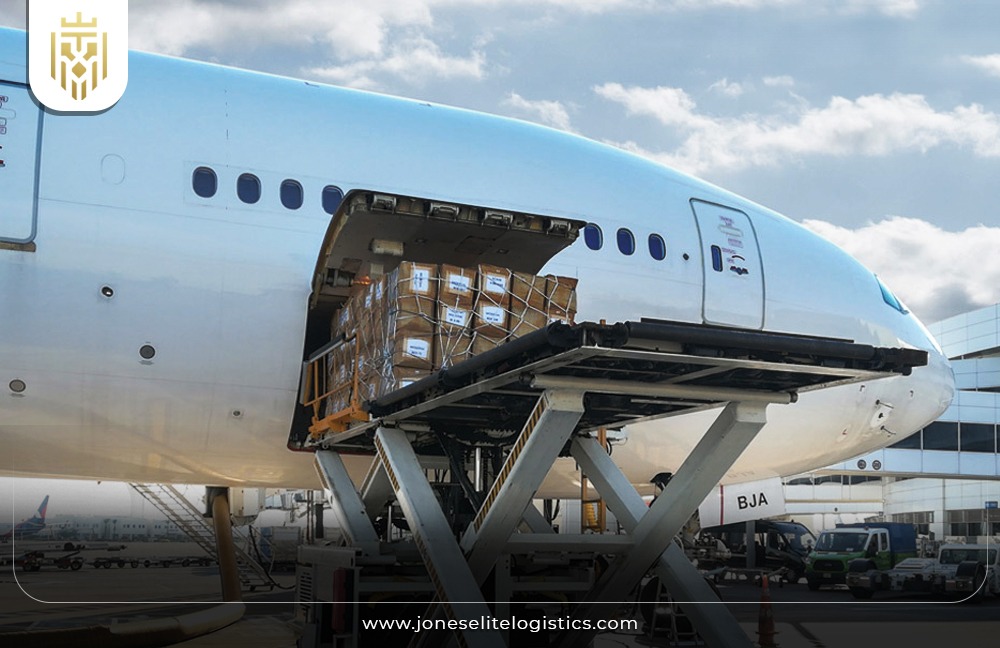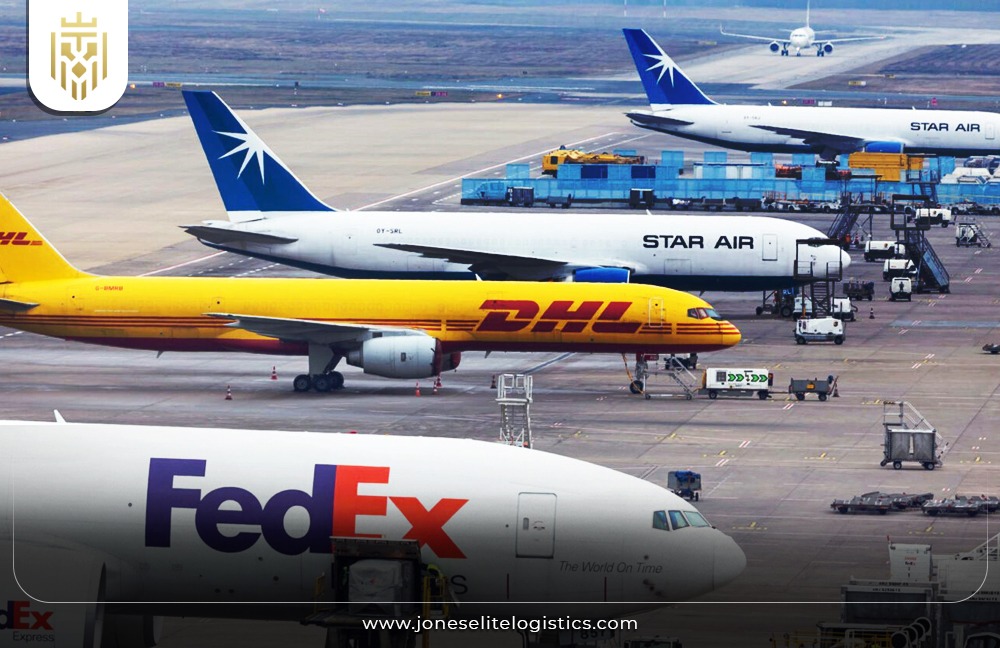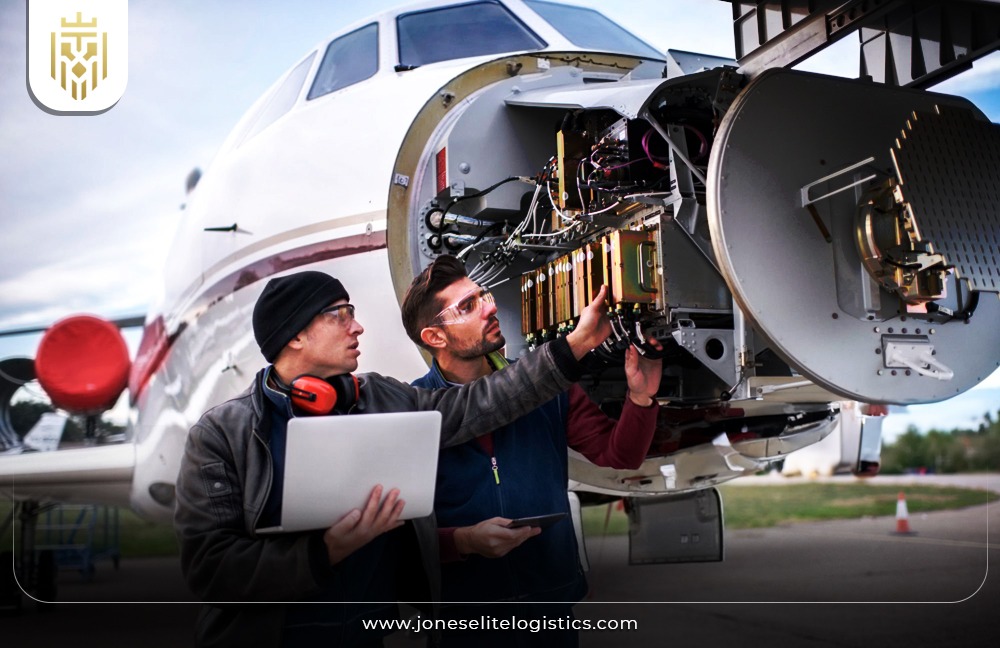What is Air Freight:
Air freight is one of the methods of transporting goods through the air transportation system which is considered to be a fast, reliable, and secure way of shipping the products to countries all over the world or within the country. It is often applied for urgent cargoes, this way goods are delivered faster than by sea or land means of transport. There are two categories of air freight: airport-to-airport and door-to-door, where the latter serves business clients who require urgent or efficient shipments.

Most Common Products shipped by Air:
Electronics, pharmaceuticals, foods like fresh produce, seafood, clothes and aromatics, jewelry, auto parts, and fashion clothing are some of the main products shipped by air. These items are often highly valued and need to be delivered and secured within the shortest time possible or safely and effectively as they are perishable.
Difference between Air Freight and Air Shipping:
Air freight refers to the movement of goods through air carriers in the form of dedicated cargo planes operated by commercial airlines or ships for bulk or large shipments. Air shipping involves all forms of air transport of small packages, mail, parcels, etc which may include a small amount of import cargo flown by passenger airlines, specialized cargo airlines, and also by courier agencies.
Types of Air Freight Services:
Getting to know the different services available is beneficial, as you can choose the required type that does not become a burden for your time and money:
Expedited Charter:
Charter Red Eye services provide immediate aircraft with direct attention to help expedite the movement of urgent shipments. They have been described as useful for time-critical and sensitive cargo that demands fast and different routes from normal ones through the provision of special services.
On Board Courier (OBC):
OBC services are based on the concept of having a courier on board the same airline on a passenger cabin along with the consignment for supervising and fast delivery. This method is employed for the most valuable and sensitive clientele who need the goods to be handled personally and should be passed on to the recipient at the utmost possible rate.
Commercial Airline:
Commercial airlines make use of the belly hold of passenger flights for the carriage of cargo using existing routes and schedules. This is one of the most affordable and readily available options, only applicable for consignments that are not large enough to be shipped with only cargo planes and should still be delivered in good time.
Cargo Airline:
Cargo carriers have large freighter aircraft that are purpose-built for transporting a lot of weight over long distances. They operate regularly scheduled flights and can be chartered for cargo shipments, ranging from industrial machinery to large retail orders, to meet the needs of businesses.

Factors Influencing Air Freight Costs:
Air Freight is made up of several factors that need to be in sync to ensure a safe and secure delivery, and they include:
Weight and Dimensions:
The cost of shipping by air is usually dependent on the weight and size of the consignment. Actual weight and volumetric weight are the two types of charges that are usually applied by courier companies. It is because some items are bigger or heavier and airlines charge more according to the space or weight the item occupies.
Transportation Route:
The route of the transportation also affects the cost of air freight where it is costly if the distance is long or not so frequent. The longest and most expensive routes are the ones with direct connections rather than multi-stop connections and the most expensive are the ones that are the hardest to reach.
Perishability:
Fresh food and pharmaceutical products are perishable and must be handled with care and delivered in a shorter time than other types of cargo and thus incur increased costs for air freight. The need to keep such goods in the best conditions possible requires additional services as well as equipment; therefore, the cost is increased.

Seasonality:
Air freight is also seasonal and its rates vary depending on demand. Seasonal demand occurs when there is a high volume of shipments during specific times of the year, such as holidays or harvest seasons, resulting in high rates because the carrier has limited capacity. On the other hand, off-peak periods may attract lower rates of electricity as demand may be low.
Commodity Type:
The degree of the perishability of the commodity determines the cost of air freight. Such products as dangerous, breakable, and valuable are subject to additional handling and packing procedures and increased security which increases the cost of shipment. The recent regulations and additional insurance for such items also add to the cost.
Shipment Mode:
The selection of the shipment mode as standard, express or expedited mode also impacts the costs. Express and expedited services take less time to deliver the package and are much more expensive compared to standard services. The need for the shipment defines the mode that is used, thus affecting the freight rate.
Fuel Prices:
Fuel prices are another factor that directly influences air freight rates. Airlines are also able to vary their fuel surcharges according to the prevailing market rates for fuel and these costs are then passed on to the shippers. The effect of fuel price increase is that the surcharges also increase thus making the cost of providing air freight services to be high.
Customs Processing:
Air freight costs are affected by duties, taxes, and fees that are related to customs processing that differ between destination countries. The cost of shipping goods internationally may also be affected by the added cost of customs clearance and documentation processing as well as compliance to regulatory requirements.

Advantages of Air Freight:
Air Freight offers advantages such as faster delivery time, dispatching of cargo anywhere, and the requirement of minimal packaging. We shall go through them in detail.
Fastest Shipment Methods:
Air freight is one of the fastest means of transporting goods as the process only takes a few hours. Goods can be transported from one corner of the world to another in a matter of hours – this is much faster than sea or land transport.
Highly Reliable Arrival and Departure Times
Air freight is usually characterized by its time and day of arrival and departure. Airlines also stick to schedules and therefore delays are minimal. This reliability is advantageous to businesses because shipments are delivered on time and this enables them to plan and manage their inventories effectively.
Send your Cargo almost Anywhere:
Air freight services enables you to reach destinations that may be inaccessible or difficult to reach otherwise from landlocked areas or areas that are not easily accessible. Air freight also offers the benefits of wide delivery coverage due to the presence of numerous global airports.
Low Insurance Premium means Large Savings:
The insurance costs for air freight are usually lower as compared to other shipping methods. The shortened transit time significantly reduces the possibility of loss or damage and is reflected in lower insurance charges, resulting in significant savings for the businesses.
High Level of Security and Reduced Risk of Theft and Damage:
Air freight comes with high-security standards; airports have some of the most stringent rules and controls. The shorter time of transiting and handling reduces the risk of theft and damage thereby ensuring the delivery of goods in good condition.
Less Need for Warehousing and Fewer Items in Stock:
The speed of air freight minimizes the carrying capacity of large warehouses because the goods can be delivered on time. This efficiency enables businesses to retain fewer items in stock thus cutting on the storage cost as well as improving cash flow.
Less Packaging Required:
Air freight generally does not involve many packages as is the case with other types of transportation. This reduces the time spent on handling and the length of transit time which decreases the risk of damage to the goods hence decreasing the amount of packaging materials and cost used.
Follow the Status of Cargo:
Air freight services provide for increased tracking of cargo and ensure that the shipper is aware of the status of the cargo at all times. This transparency gives the customer confidence and helps better organize logistics and delivery schedules.

Challenges and Limitations of Air Freight:
Air freight offers several advantages, however, it also comes with its set of challenges that need to be kept in one’s mind.
Shipping Cost:
Air freight is usually more costly compared to other means of transportation such as maritime or land transportation. They are high because they take into account the price of the fuel used, security measures, and the fact that such goods require special handling and cannot be transported in large quantities and at low prices.
Cargo Capacity:
Air cargo is a relatively small mode of transport compared to sea or rail freight. Aircraft are also limited by their size and weight capacity, making it difficult when ship large or heavy items and therefore making the aircraft inefficient in the transportation of bulk.
Environmental Impact:
Air transport is considered to be one of the most harmful to the environment due to high fuel consumption and carbon emissions. It causes air pollution and global warming and thus attracts more attention from society and more pressure to become a more environmentally friendly industry.
Shipment Visibility:
Although air freight shipping provides more advanced tracking systems, real-time shipment visibility remains somewhat of a challenge because of the complexity of the supply chain as well as the different technologies employed by various carriers. Late changes can create uncertainty and make it difficult to share information regarding the supply chain.
Reliability:
While air freight is usually predictable, there are some challenges, such as weather conditions, delays in air traffic control, and security threats. Such factors can lead to delays and interruptions that affect the on-time delivery of products.
Speed:
Air freight is the fastest mode of transportation but it has its disadvantages as well due to the possibility of delays in customs processing, security checks, and the lack of availability of flights, especially in remote areas.

Future Trends and Innovation:
Air freight in the future will be characterized by greater automation including the use of drones and self-flying planes to enable high efficiency and lower costs. The environment will be addressed by the use of new technologies such as sustainable aviation fuels and electric aircraft. Blockchain technology and digitalization will make the monitoring of shipments safer and more transparent; integrated logistics will reduce the cost of air transport and make it more environmentally friendly.
FAQs
1. What is air freight?
Airfreight is the mode of transporting commodities through the air. It is the best and most convenient means of transporting items from one place to another, especially over long distances, which makes it easy for the delivery of products to countries and continents in the shortest time possible.
2. What are the advantages of air freight?
Air freight is fast, reliable, and has a broad network. It is especially beneficial in delivering time-sensitive items, cuts down on inventory costs due to shorter delivery times, and offers high security for valuable cargo. Further, it allows for remote site operations.
3. What are the challenges of air freight?
Some of the disadvantages of air freight include higher rates associated with other transportation means, less cargo space, stringent legal requirements, weather or traffic delays, and environmentally unfriendly means of transport.
4. Air freight Services?
Air freight services comprise express services, deferred services, and charter services. These services transport all types of cargo, door-to-door delivery of cargo, customs clearance of the cargo, and real-time updates on the status of the shipment.
5. What are the types of air freight?
Types of air freight include non-perishable and perishable goods, dangerous goods, and outsized cargo. All of them come with different conditions concerning their handling and transportation and adhere to international regulations.







